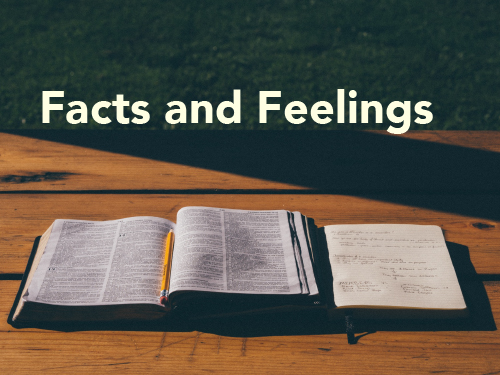FACTS AND FEELINGS

Written by Doug Ponder on November 18, 2016
Facts Don’t Care About Your Feelings
“Facts don’t care about your feelings.” That’s what one infamously controversial political columnist / cultural commentator has pinned to the top of his Twitter profile. What he says is true, but—ironically—that doesn’t mean people like it. And it’s important to point out, as obvious as it may seem, that “Facts don’t care about your feelings” is still true even if we don’t like the statement! “The truth does not change according to our ability to stomach it,” as author Flannery O’Connor rightly says.
Consider the following example: Two plus two equals four, even if I think it doesn’t. Two plus two equals four even if I don’t know math or can’t read numbers. Two plus two equals four even if I “feel very strongly” that it equals something else. Two plus two equals four for men and women, for old and for young, for Whites, Blacks, Asians, and Latinos. Two plus two equals four even if the person who taught me math was a hypocritical jerk. Two plus two equals four because it’s true—no matter what I think, feel, or want to be true.
Or take a more recent example: Donald Trump is now my president even though I did not vote for him, and even though I very strongly wish that he (and Hillary too) had lost by a landslide. Donald Trump is the president now matter how much I hate this fact, and no hashtag can change this reality. #NotMyPresident is still my president. It stinks. I don’t like it. But it’s still true (and the truth doesn’t change according to my ability to stomach it).
Truth Is True and Reality Is Real
All of this matters, because we live in a time when people are increasingly confused about what is real.
“Your version of truth is determined by your perspective.”
“There is no truth; there is only perception.”
“Everything we hear is an opinion, not a fact. Everything we see is perspective, not the truth.”
“Your truth and my truth may not be the same.”
These statements—and thousands others like them—have the appearance of wisdom, but they only pass in places like the Internet and freshman philosophy papers. Because facts exist. Truth is really real—even if I’m wrong about it, don’t know about it, or lack the capacity to know it altogether. If a man who could not taste, touch, see, hear or smell tried to walk through my office, he would bump into several cold hard facts of reality (in the shape of a chair, a couch, and a computer desk). The world is there; things exist outside of us and apart from us, and facts are true whether we see them, believe in them, or like them.
So facts are fixed realities that do not change according to our belief or our behavior or our agreement with them. Which means that truth is true irrespective of my knowledge of the truth. Reality is real regardless of my thoughts or feelings about reality.
Why This Matters Every Day
All this means that if the God of the Bible exists, then he exists whether I believe in him or not. My belief doesn’t make God real, just as someone else’s disbelief doesn’t make God unreal. Furthermore, if the God of the Bible exists, then sin would be wrong even if I like it or don’t think it’s all that bad. The rightness of an action, attitude, idea, or practice would be rooted in God’s vision for flourishing as spelled out in the pages of the Scriptures.
The realness of reality and the irrelevance of feelings in relation to facts also means that my identity is rooted in who God made me, not in my own self-identification. If I felt like a woman born in a man’s body, my DNA would say otherwise. Or I if felt like men and women are identical in every respect, these differences between men and women would still persist (even in a culture that attempts to downplay, diminish, or deny those differences). Or I may feel that I’m the most awesome person alive, but that doesn’t make it true. Or I may think that I am a piece of trash or worthless nobody, but the God of the universe says otherwise. He made me, and he loves me!
Finally, understanding that feelings don’t change facts has tremendous import for grasping the gospel as well. It means that how I feel about God has nothing to do with how he feels about me. I may feel incredibly guilty or even condemned, for example, but in Christ I am truly free from guilt and condemnation. It also means that God’s goodness toward me is a reality at all times, even when I have trouble seeing it or remembering it. The truth of the gospel is true—it’s really real—even on days when I have trouble believing it. For the ground of my assurance is the fact of Jesus’ death and resurrection for me, not my feelings about them from day to day. Or as theologian Don Carson rightly says, “It is not the intensity of our faith [a feeling] but the object of our faith [Jesus] that saves us.”
Doug Ponder is one of the founding pastors of Remnant Church in Richmond, VA, where he serves in many of the church’s teaching ministries. He has contributed to several published works and is a regular contributor to RE|SOURCE. His interests include the intersection of theology, ethics, and the Christian life. Follow him on Twitter @dougponder.





